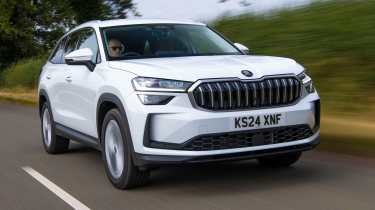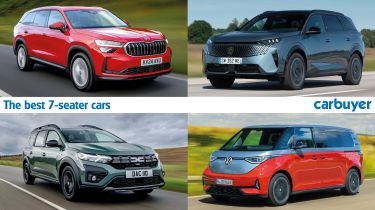Skoda Kodiaq review – more practical and higher quality than before


While there are plenty of great practical SUVs and family cars on sale today, some motorists with large families need the convenience of a seven-seater car. Bespoke multi-purpose vehicles (MPVs) were once the model of choice in this market, but today you can find seven-seater cars of all shapes and sizes, from SUVs to models based on commercial vans.
Generally speaking, van-based MPVs will offer the most space for seven passengers, with SUVs typically offering smaller rear jump-seats. Choosing the right model for you will depend on several factors, including how often you plan to use the rearmost seats, who will be using them, and whether you want something that looks and feels more car-like. We’ve included a selection of both below, at varying price points with a range of engine options.
We have discounted some of the most expensive seven-seater SUVs from this list – such as the Range Rover and Bentley Bentayga – as their six-figure price tags place them beyond the reach of most families. If you’re interested in a family car with lashings of luxury, you can read our dedicated list of the best luxury SUVs, many of which have seven seats.
Read on for our full run-down of the best seven-seater cars on sale today. We’ve also covered the best used seven-seater cars you can buy if you’re working to a tighter budget.
The Skoda Kodiaq is the company’s largest offering and a hugely impressive all-round package – so much so that the old model won our 2024 Carbuyer award for the best large family car. The new model, introduced in 2024, has grown in size and offers even more space for seven passengers.
What marks it out is the fantastic combination of style, practicality, fuel economy and value it offers. It’s also good to drive – comfortable when it needs to be, but still engaging when the going gets twisty. Under the bonnet there’s a familiar range of Volkswagen Group petrol and diesel engines that produce all the punch you could want, without breaking the bank when it comes to fuel economy.
All Kodiaqs – bar the entry-level SE model – come with seven seats as standard. When fitted, the third row of seats isn't really suited to long journeys or spacious enough for adults, but it's perfect for the school run and other short journeys. Also – and unlike some seven-seaters – the Kodiaq has a usable amount of boot space with all seven seats in place: about 340 litres. Meanwhile, if you drop all five rear seats, you get a maximum of 2,015 litres of load space – enough for pretty much any eventuality.
|
Pros |
Cons |
|
|
Starting from just over £18,000 you won’t find a new seven-seater car for less than the Dacia Jogger. The price has marginally crept up since it first arrived in 2021, but the introduction of a hybrid model has made the MPV more versatile than ever, combining its great practicality with even lower running costs. Baseline Essential models are only available with the simple, yet capable petrol engine, and for the hybrid you’ll have to step up to mid-range Expression trim, starting around a very reasonable £23,000 at the time of writing. The interior is fairly spartan and it lacks some of the latest safety and assistance tech, but there’s no denying the Jogger’s great value for money.
Boot space is more limited than its larger, and more expensive rivals, with 213 litres available if the third row seats are up and 699 litres with the third row folded down. However, there are storage compartments dotted around the car, adding up to an additional 23 litres, and maximising handy storage for occupants.
|
Pros |
Cons |
|
|
Despite a hefty £65,000 price tag, the Kia EV9 can't be dismissed. It’s something of a milestone for the brand because, as its most expensive model, it's still able to excel in the electric SUV market, even against premium competitors. It’s massive, comfortable and quiet, and makes for a compelling electric alternative to the other seven-seaters on this list.
At over five metres long, there’s no hiding the EV9’s size on the move. It feels like a big car along our narrow British roads, but the responsive electric powertrain means it never feels short on power. Its large exterior dimensions translate to a vast cabin which features a completely flat floor, providing plenty of space for up to seven passengers. Kia offers a six-seater layout for the EV9, too – complete with two comfortable swivelling captain’s chairs in the middle row – but all variants are roomy enough for families.
The cabin is dotted with helpful features that make it a pleasant place to spend time, albeit not quite as luxurious as a BMW X7. Technology is strong, though, with a pair of large digital displays up front and plenty of USB ports throughout.
|
Pros |
Cons |
|
|
The Hyundai Santa Fe is confidently and unashamedly boxy, with a chunky, squared-off look that stands out amongst most modern SUVs with swoopier styling. However, that bold design pays dividends on the inside, resulting in a vast cabin that can accommodate up to seven adults in comfort.
The cabin isn’t just spacious, it’s well-equipped, too, featuring all the tech you could want and premium materials for all the main touch points and surfaces. There are two large digital displays – one sitting ahead of the driver and another for the infotainment – while we like that Hyundai has retained physical controls for important functions, such as climate control and media volume. Importantly, the third row of seats is big enough for adults to sit comfortably on long journeys – something that many seven-seat SUVs can’t match. Like the Kia EV9, there’s an optional six-seater layout, too, swapping the second row for two swivelling captain’s chairs.
While the Santa Fe’s blunt design doesn’t look very aerodynamic, a choice of hybrid and plug-in hybrid petrol engines should make it fairly fuel-efficient for its class. Hyundai’s decision to prioritise comfort over speed further bolsters its family-hauling credentials.
|
Pros |
Cons |
|
|
The old Peugeot 5008 was a capable and spacious seven-seater SUV, and the all-new model improves on those strengths. It’s grown an extra 150mm in length so the interior is even roomier, with all models getting seven seats. Peugeot has tweaked the second row of seats – the two outside seats have grown in width, while the centre seat is now skinnier and lacks ISOFIX points. That will be a deal-breaker for some families, but if you rarely use the middle seat, you’ll find the outer seats comfier than before.
The rearmost two seats aren’t the biggest on this list, but they work fine for adults in a pinch. Children will fit without an issue and accessing them is fairly easy thanks to the folding and sliding second row of seats. Boot space can’t match that of the Skoda Kodiaq, but with 748 litres of space with the rearmost seats folded there will be more than enough space for most families.
The Peugeot E-5008 is the electric version of the 5008 SUV, and delivers class-leading range and a comfortable driving experience. Base single-motor models can travel up to 311 miles on a charge, while the pricier dual-motor car is rated for over 400 miles. It’s not a particularly quick car but it can handle motorway slip roads without an issue and it makes for a very relaxing long distance cruiser. At nearly £50,000 the EV is a pricey proposition, but Peugeot also sells a PHEV and petrol-powered 5008, both of which are more affordable.
|
Pros |
Cons |
|
|
A previous winner of Best Family Car in our 2022 Carbuyer Car of the Year awards, the Kia Sorento continues to prove itself as a great family car that combines space and a lavishly-equipped interior. It even performs admirably as a load-lugger, with 2,011 litres of boot space with all the rear seats folded down.
In top-spec ‘4’ trim, the Sorento comes equipped with all the kit you could possibly want, from a head-up display to a 360-degree parking camera, but even the entry-level model will have enough tech for most buyers. Things have improved further with the facelifted model, which packs a more upmarket interior and some refreshed styling.
Whichever model you choose, you’ll get a third row of seats. They’re not as big as some MPV rivals, but there’s a surprising amount of head and knee room that will allow smaller adults to fit for shorter trips. Kids should squeeze in without any issue, and all passengers get their own cup holder and USB port for charging devices.
|
Pros |
Cons |
|
|
The Volkswagen ID. Buzz arrived to great fanfare in 2022, with its retro-inspired styling harking back to the iconic Volkswagen Type 2. However, it couldn’t quite live up to its van-like looks when it launched with only five seats, limiting its practicality with larger families. Volkwagen rectified that in 2024 with the introduction of the ID. Buzz LWB (Long Wheelbase), making it a much more usable family car proposition. Even more impressive was the fact that the addition of two extra seats only increased the price by a marginal £510.
The ID. Buzz is electric only, packing a 282bhp motor for some reasonably nippy performance. Long Wheelbase models get an 83kWh battery, good for up to 283 miles of range, while it can be recharged at speeds of up to 200kW. Importantly, the ID. Buzz was designed as a passenger car from the outset – unlike many large seven, eight and nine-seater van-based MPVs – meaning it doesn’t feel van-like from behind the wheel.
Thanks to a boxy silhouette there’s masses of headroom for all passengers in the ID. Buzz. Unsurprisingly, boot space is enormous, with up to 2,205 litres of space with all the seats folded flat; the sliding doors also add an extra layer of practicality. However, the ID. Buzz isn’t cheap – at nearly £60,000, it will be out of the reach of most families. If your sole priority is seven seats you can find a cheaper alternative on this list, but the ID. Buzz is still one of the most stylish and versatile seven-seaters on sale.
|
Pros |
Cons |
|
|
If you’re after an off-road capable seven-seater, then the Defender ticks both those boxes. It had a tough job on its hands when it took over from the classic Defender a few years ago, but the latest car is definitely worthy of the nameplate, and is surprisingly versatile.
Defender 110 models can be configured with a number of seating layouts. The standard car gets five seats, but buyers can add an optional middle jumpseat in the front for a six-seater layout, or even choose to add an extra third row for seven seats. There’s even the option of an eight-seater version if you go for the stretched Defender 130. If you’ve got a lot of people to ferry around over rough terrain, you’re well-catered for, but be warned that the third row of seats is rather cramped – it’s best suited for children.
While the Defender name is synonymous with rough and ready no frills off-roading, the latest Defender is much more luxurious, getting Land Rover’s Pivi Pro infotainment system, sumptuous leather upholstery, and gadgetry such as a digital instrument cluster, depending on which of the various trims you go for. You’ll need at least £67,000 for a seven-seater Defender, though, and be prepared for that price to rise once you’ve ticked a few option boxes.
|
Pros |
Cons |
|
|
Citroen offers the electric version of its Berlingo MPV, the e-Berlingo, in a seven-seater XL model, offering the low running costs and zero emissions associated with an EV along with extra practicality for a large family. Admittedly, the Citroen e-Berlingo XL doesn’t do much to hide its van-like origins, and most won’t buy it for the way this upright MPV looks. However, when we drove the smaller five-seater model we were surprised by its manners – it won’t feel too alien to drive if you’re coming from a more conventional family car, although the XL’s added length might take some getting used to.
The e-Berlingo XL is best suited to buyers taking short trips around town, given its official electric range of up to 177 miles to a charge, which could be hard to manage if you’re driving around with the car fully occupied. Buyers who regularly need to do longer trips might be best looking elsewhere though, as the petrol and diesel Berlingo is only offered with five seats.
|
Pros |
Cons |
|
|
The Tourneo Connect is the middle option out of the three van-based MPVs that Ford offers, sitting above the five-seater Tourneo Courier and below the giant Tourneo Custom. For most families it will be the pick of the bunch, thanks to its cavernous interior, car-like driving experience and flexible seating arrangement. It’s offered in two sizes: Tourneo and Grand Tourneo – the latter of these offers some extra legroom and easier access for the rear pair of seats.
Speaking of seats, no matter where you’re sitting in the Tourneo Connect you have masses of headroom – far more than you’d find in a seven-seater SUV. A pair of huge sliding doors make getting in and out of the back easy, and the seats all fold flat to create a cavernous boot.
Under the metalwork, the Ford Tourneo Connect is essentially a rebadged version of the Volkswagen Caddy. Both get the same choice of petrol and diesel engines – which are shared with the Volkswagen Golf – although Ford only offers the Tourneo Connect with an automatic gearbox. It’s not a quick car, and it can feel a bit underpowered when fully-loaded with seven passengers, but it has more than enough performance for around town.
|
Pros |
Cons |
|
|
For a selection of more affordable options, read our list of the best used seven-seater cars…



